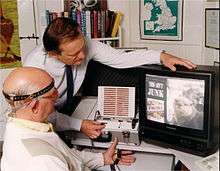David Lewis (psychologist)

Dr David Lewis, a French-born neuropsychologist, is founder and Director at the independent research consultancy Mindlab International based at the Sussex Innovation Centre in Brighton. Additionally, he is a chartered Psychologist, a best selling author and International Lecturer. Dubbed the 'father of neuromarketing' for his pioneering studies of analysing brain activity for research and commercial purposes, he currently specialises in non-invasive techniques for measuring human responses under real life conditions.
He has a first class honours degree in psychology and biology from the University of Westminster and a doctorate from the Department of Experimental Psychology at the University of Sussex, where he lectured in clinical psychology and psychopathology before setting up his own research organisation.
He is the author of more than thirty books covering a wide range of psychological topics, a lecturer and Sony award-winning broadcaster for a BBC Radio 5 Live series on the psychological relationships between sports stars and their mentors and trainers.
David Lewis was dubbed the 'father of neuromarketing' as he was one of the first psychologists to recognise the potential of measuring brain activity as a means of understanding the responses of consumers. These studies started in the early 1980s while he was a doctoral student at the University of Sussex and required him to develop both the hardware and software necessary to monitor and record electrical activity in the brain.
In the early 90s his work was featured on BBC TV's Tomorrow's World but it would be more than a decade before the importance of the insights provided by such studies became widely accepted.
Bibliography
- The Secret Language of Your Child. How Children Talk Before they Can Speak, 1978. ISBN 0-285-62358-3.
- Thinking Better, (with James Greene) 1982. ISBN 0-89256-168-8
- Know Your Own Mind, (with James Green) 1983. ISBN 0-89256-265-X.
- Fight Your Phobia and Win, 1984 ISBN 0-85969-398-8.
- Loving and Loathing, 1985 ISBN 0-09-466250-9.
- The Alpha Plan, 1986. ISBN 0-413-59740-7.
- Mind Skills. Giving Your Child a Brighter Future, 1987. ISBN 0-586-20034-7.
- Helping Your Anxious Child, 1988. ISBN 0-413-17100-0.
- Heart Attack, 1990 ISBN 0-7225-3227-X
- Help Your Child Through School, 1992. ISBN 0091754356
- Information Overload. Practical Strategies for Surviving in Today's Workplace, 1999
- The Soul of the New Consumer: Authenticity What We Buy and Why in the New Economy, (with Darren Bridger) 2000 ISBN 1-85788-246-6
- The Man who invented Hitler, 2003. ISBN 0-7553-1148-5. New Ed edition (November 1, 2004), Publisher: Headline Book Publishing; ISBN 0-7553-1149-3. ISBN 978-0-7553-1149-1
- Pass That Exam, (DVD) 2002
- Mastering Your Memory, (DVD) 2007
- Impulse: Why We Do What We Do Without Knowing It, 2013. ISBN 1847946852
References
External links
- Dr David Lewis - his business homepage.
- Short bookreview
- Mindlab International